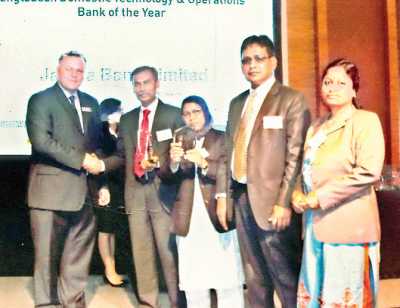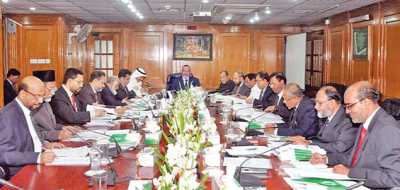‘Invest in productive sector
The Central Bank Deputy Governor Nazneen Sultana yesterday urged the non- residence Bangladeshis (NRB) to invest their hard earned money in country’s productive sector to facilitate economic growth.
“Country’s economy is gradually growing but this is not enough, we have to attain our expected level of economic development, the BB deputy governor said while addressing a seminar tilled as ‘Survey of Impact of migration on Poverty and Development’ at city’s Brac In centre. The day long seminar was organized by Refugee and Migratory Movements Research Unit (RMMRU) of Dhaka University.
She suggested the NRB,s to invest their money in country’s SME and agro sector to ensure economic advancement.
The central bank is continuously encouraging all private banks to provide access to finance for country’s underprivileged people to receive financial assistance so that they can operate their business smoothly.
The aim of the central bank is ‘inclusive financial growth and viable economy’ and to implement the theory, we introduced low rate SME and agro loan under refinance facilities.
Considering the necessity of a vibrant economy, the deputy governor said that migrant people can take loan from the bank for using any kinds of productive sector.
Already the central bank approved foreign loan for country’s business community and the rate is very low comparing with the local financer which will help them to operate their business smoothly, also added the deputy governor.
However, talking to the ‘The Independent’ Professor Mustafizur Rahman, Executive Director, CPD said the ‘the Independent’ that the non resident Bangladesh should invest their money in the productive sector instead of constructing house, building and so on.
Meanwhile, Tasneem Siddiqui , chair of RMMRU presented a key note paper titled “Impact of Migration on Poverty and Development”
Hossain Zillur Rahman Former Advisor to the Caretaker Government prented the seminar as the chief guest.
The day long seminar also participated by Dr. Khondaker Showkat Hossain, Secretary Ministry of Expatriates’ Welfare and Overseas Employment, Zahid Hussain, Lead Economist of World Bank, . Siroco Messerli, Deputy Head of Cooperation, Swiss Agency for Development and Cooperation, and M Riaz Hamidullah, Director General of Economic Affairs.
News:The Independent/1-Sep-2014
BB changes repatriation process of share sale proceeds
Bangladesh Bank (BB) yesterday made some changes to the repatriation of sale proceeds of non-resident owned equity in unlisted companies purchased by residents, reports BSS.
"It has now been decided that in such cases Bangladesh Bank will accept fair value of the shares as on the date of sale based on appropriate combination of three valuation approaches (viz. net asset value approach, market value approach and discounted cash flow approach) depending on the nature of the company,” the central bank said in a circular. According to the Guidelines for Foreign Exchange Transactions-2009, the sale proceeds of non-resident equity investment in unlisted companies and private limited companies are repatriable abroad with prior approval from BB to the extent of net asset value of the shares as on the date of sales, based on latest audited financial statements.
The central bank in its latest circular directed all the authorised dealers of foreign exchanges to submit the application for repatriation of sale proceeds of shares to Foreign Exchange Investment Department at head office of BB with a valuation certificate of shares issued by a merchant banker licensed by Bangladesh Securities and Exchange Commission (BSEC) or a chartered accountant experienced in company valuation.
Full set of audited financial statements of the company will have to be submitted to BB along with application for
remittance approval, the circular said.
BB brings cheer to foreign investors
Non-resident investors will now get higher returns from sales of shares in local firms as central bank relaxes rules
Foreign investors having stakes in Bangladeshi private companies will now get higher returns if they sell their shares, as the central bank has introduced globally-accepted approaches to value such firms.
Analysts say the move will encourage overseas investment in local companies.
Along with the currently practised 'net asset value approach' for determining the repatriable value of shares, Bangladesh Bank has adopted two more methods: market value approach and income approach or discounted cash flow approach.
Take an illustrative example under the three methods: If the price of a company's share stands at Tk 50 based on net asset value, it could be valued at Tk 100 in market value and Tk 200 in the income approach.
The BB will accept any of the three approaches or an average of the three in valuing the shares, depending on the nature of the company, it said in a notice yesterday.
“This is an important change which will contribute to a rise in foreign investment via the private equity channel as we have adopted global best-practised valuation methods,” said Hassan Zaman, chief economist of the central bank.
It is part of the process of prudently liberalising the foreign exchange regime and the access to equity capital will lead to companies expanding and creating jobs, he added.
Another BB official said the previous method is conservative and allows foreign investors to repatriate a small amount of their investments in Bangladeshi private companies.
Under the old system, overseas investors could not repatriate the true value of a company, he said.
Net asset value is estimated by deducting all liabilities of a company from its total assets. It is a conservative valuation, which does not take into account the future potential of a company.
However, the method can be used in certain cases, for example, when a company is not currently operating. The market value approach is mostly based on the price earnings (PE) ratio, which is a company's market price per share divided by its earnings per share (EPS).
The PE ratio provides an indication of how much investors are willing to pay for a company's earnings. For example, 15 PE ratio of a company means investors or buyers are ready to pay 15 times higher than the company's EPS to get a share.
Valuation of unlisted companies in the income approach or discounted cash flow approach is highly sensitive to assumptions of future cash flows. In practice, the method is not used in isolation and used as one of the drivers to determine the final price, the BB said. The income approach is primarily driven by three key inputs such as free cash flow, terminal value and discount rate.
Application for repatriation of sale proceeds of shares will have to be submitted to the foreign exchange investment department of the central bank with a valuation certificate, issued by a merchant bank or a chartered accountant.
The valuation certificates will have to be supported by full explanation justifying the fair value. Audited financial statements of the company will also have to be submitted along with the application for remittance approval, the BB said.
The central bank, however, can scrutinise the valuation by another chartered accountant, if it is not satisfied about the appropriateness of the valuation of shares, the notice added.
News:The Daily Star/1-Sep-2014Janata Bank gets Asian Banking, Finance Award

Janata Bank Limited was honoured with the ‘Asian Banking & Finance Award 2014’ by Asian Banking & Finance Magazine, a Singapore-based magazine.
Tim Charlton, Editor in Chief, Asian Banking & Finance recently handed over the award to Md Abul Monsur, Deputy General Manager of Janata Bank, said a press release.
Janata Bank is the only bank of Bangladesh that has achieved this rarely gotten prestige by becoming the Bangladesh Domestic Trade Finance Bank of the Year and the Bangladesh Domestic Technology and Operations Bank of the Year.
Islami Bank holds board meeting

Prof. Abu Nasser Muhammad Abduz Zaher, Chairman of the Board of Directors of Islami Bank Bangladesh Limited, presides over a meeting of Board of Directors of the bank at Islami Bank Tower in Dhaka on Sunday.
A meeting of the Board of Directors of Islami Bank Bangladesh Limited was held at the Islami Bank Tower in Dhaka on Sunday.
Prof. Abu Nasser Muhammad Abduz Zaher, Chairman of the bank presided over the meeting, said a press release.



